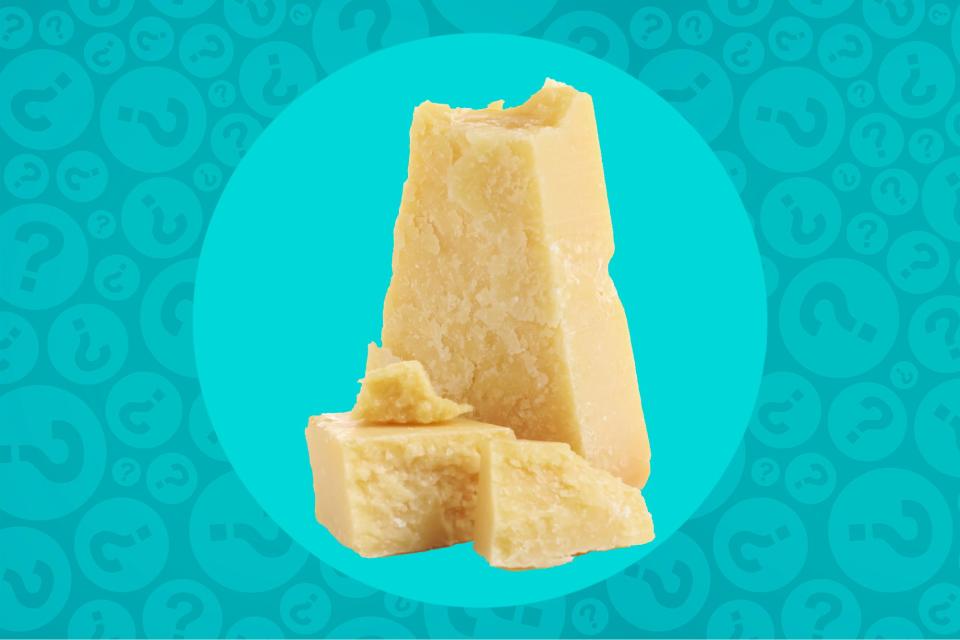The Surprising Reason Why Some Types of Parmesan Cheese Aren't Vegetarian
Plus how to find one that is.

Used to be, when I thought of vegetarian proteins, cheese came quickly to mind. I've often thrown together a veggie dish like eggplant parmesan or pasta with broccoli showered with cheese for my meat-averse friends. So when this question came up, I thought the answer was obvious. Parmesan is cheese! And not just any obscure cheese—it's one of the world's most popular types, a global market valued at $16.4 billion in 2022. It's widely used in salad kits, meal kits, frozen foods and restaurants all the way from quick-serve to fine dining. Of course it's vegetarian! Otherwise, how would it cater to so many?
Related: 6 "Polite" Things You Do When Cooking for Your Vegetarian Friends That Are Actually Rude
However, the answer isn't as cut and dried as a slice of this beloved hard cheese. Rather, Parmesan is yet another example of how important it is to read food labels and understand the ingredients in our fridges and our food. Let's get granular about it.
What Is Parmesan Cheese?
First of all, Parmesan cheese is a general term with multiple interpretations. At the top of the hierarchy of this categorization sits authentic Parmigiano Reggiano.
"Crafted exclusively of only three ingredients —rennet, salt and raw, unpasteurized milk—Parmigiano Reggiano bears the EU designation of Protected Designation of Origin (PDO) or in Italian, Denominazione di Origine Protetta (DOP), which indicates that it has distinctive characteristics tied to its area of origin," shares Michele Casadei Massari, U.S. brand ambassador of Parmigiano Reggiano,.
For this cheese, that also means it's made solely in the provinces of Parma, Reggio Emilia, Modena, Mantua (but only to the right of the Po River) or Bologna (only to the left of the Reno River). Every step of its production, from milking to grating, must occur here.
"In addition, Parmigiano Reggiano arises out of strictly established artisanal and natural methods," Casadei Massari says, which means no additives or preservatives. He concludes, "Lastly, each and every single wheel of Parmigiano Reggiano is inspected by a master from the Consorzio del Parmigiano Reggiano, the product's official governing body, before it's put on shelves."
So while Parmigiano Reggiano is Parmesan cheese, most Parmesan cheese is not Parmigiano Reggiano.
For example, there's fellow DOP-regulated Parmesan Grana Padano, which can be produced across a wider geographic area, whose production may include a protein found in egg whites to keep fermentation more controlled, and allows it to be sold after a 9-month minimum versus 12 months for Parmigiano Reggiano, he explains.
Then we have the unregulated American-made Parmesan cheeses that may be made the same way, aged similarly and taste as good, but can never be called Parmigiano Reggiano since they're not from Italy.
So Why Isn't Parmesan Cheese Vegetarian?
This answer is encapsulated in one word: rennet. Specifically animal rennet, collected from slaughtered cows, goats or other young, milk-fed ruminant animals.
"As a key part of the age-old production process of Parmigiano Reggiano," which goes back nearly a thousand years, Casadei Massari says, "milk slowly and naturally coagulates with the addition of the enzyme rennet." Many, many cheeses are made with animal rennet, including Pecorino Romano, Gorgonzola, Gruyère, manchego and some Cheddars and mozzarellas. Organic Valley's Marketing Manager Andrew Westrich adds, "Production of all hard cheeses requires usage of rennet-type enzymes."
Is Any Parmesan Cheese Vegetarian?
The good news is yes. Because although the enzyme that comprises rennet is always animal-based, there are now vegetable-based enzymes—obtained by soaking plants like artichokes or thistles—and microbial-based substitutes, which are made from mold enzymes extracted in a lab.
For example, Organic Valley Shredded Parmesan makes a vegetarian-friendly version, solely "so more people can enjoy Parmesan's complex flavors," Westrich says. Their use of organic milk from pasture-raised cows and a 300-day aging process is what he credits with being able to re-create the rich, deep taste of its Italian DOP counterpart.
In addition to Organic Valley's vegetarian Parm, producers like BelGioioso also have their own versions, and vegans can look for grated Parmesan from GOOD PLANeT Foods. For something more artisan, top picks include Kinara by Fiandino, a hard cheese made in Piemonte, Italy, from raw cow's milk and thistle rennet, and Twineham Grange, which uses vegetable rennet and is the only cheese of its type that is Vegetarian Society Approved. However, both of these are much harder to find.
Bottom Line
So is Parmesan cheese vegetarian? While Parmigiano Reggiano is not, it is possible to find vegetarian Parmesan cheese at the grocery store. If you want to avoid cheese made with rennet, look for cheeses labeled vegetarian or check the ingredient list for enzymes instead of rennet. You might just discover a new product to fall in love with.

